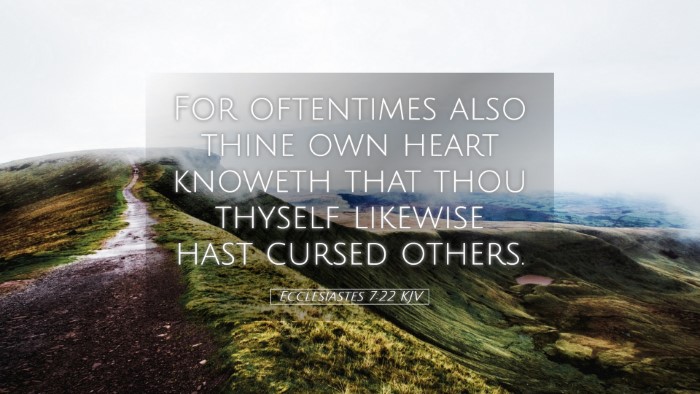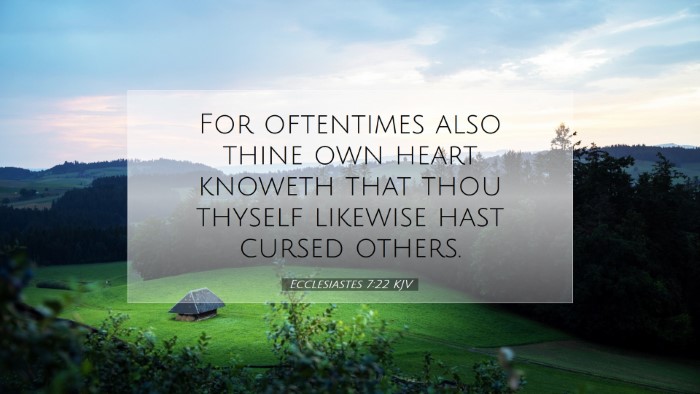Ecclesiastes 7:22 - Commentary and Insights
The verse Ecclesiastes 7:22 states:
"For you know in your own heart that even you have cursed others many times."
This verse carries profound implications regarding human nature, our interactions with others, and the wisdom we acquire through experiences. The following commentary synthesizes insights from public domain sources, including Matthew Henry, Albert Barnes, and Adam Clarke, aiming to provide depth to this exploration.
Contextual Background
The book of Ecclesiastes is authored by King Solomon, reflecting on the meaning of life and the pursuit of wisdom. Chapter 7 is a meditation on the nature of wisdom, the usefulness of sorrow, and the realities of human existence. Within this context, verse 22 serves as a stark reminder of the hypocrisy that often accompanies human judgment.
The Nature of Human Judgment
Matthew Henry emphasizes the tendency for individuals to focus on the faults of others while being blind to their own shortcomings. This self-deception leads to a lack of genuine compassion and understanding.
- Self-awareness: If we overlook our own failings, we are in a precarious position to judge others accurately. Recognizing our own flaws fosters humility.
- Human nature: Henry points out that cursing others, whether in thought or speech, is a common, almost instinctual, reaction when faced with the sins of others.
The Implications of Cursing Others
Albert Barnes delves deeper into the implications of the phrase "you have cursed others". He identifies this as a metaphor for speaking ill of others and highlights several significant aspects:
- Relational dynamics: Barnes argues that our interactions often reveal our inner judgments, leading to a cycle of negativity that can harm relationships.
- Spiritual consequences: Cursing others not only alienates us from them but also distances us from God, as it contradicts the command to love one another.
Contrasting Our Thoughts with God’s Word
Adam Clarke provides an interesting perspective on the need for introspection. He suggests that understanding our own propensity to sin helps us approach others with grace. Clarke posits:
- Reflection: Every time we find ourselves judging others, we should take a moment to reflect on our own behavior.
- Grace and forgiveness: Acknowledging our faults positions us not only to forgive but also to extend grace to those who have wronged us.
Practical Application for Believers
The insights from Ecclesiastes 7:22 call for a practical application of humility and grace in everyday dealings:
- Regular self-examination: Pastors and students of the Bible should cultivate an ongoing practice of self-examination to combat arrogance and pride.
- Promoting a culture of grace: Creating environments in homes, churches, and communities where grace is emphasized will lead to deeper, more loving relationships.
- Encouraging accountability: Responsible relationships that allow for honest feedback help to keep us aware of our shortcomings.
Conclusion
Ecclesiastes 7:22 serves as a powerful reminder that our interactions with others reflect our internal state. As we recognize our propensity to criticize and curse others, we are called to a higher standard of love and humility.
This verse encourages believers, theologians, and pastors alike to cultivate self-awareness and understanding, allowing for a spirit of grace in our communities. Whether in prayer, study, or application, let us seek to embody the wisdom that Solomon provides—humility towards others derived from acknowledging our own nature.
References for Further Study
- Matthew Henry: Commentary on the Whole Bible
- Albert Barnes: Notes on the Old Testament
- Adam Clarke: Clarke's Commentary on the Bible


